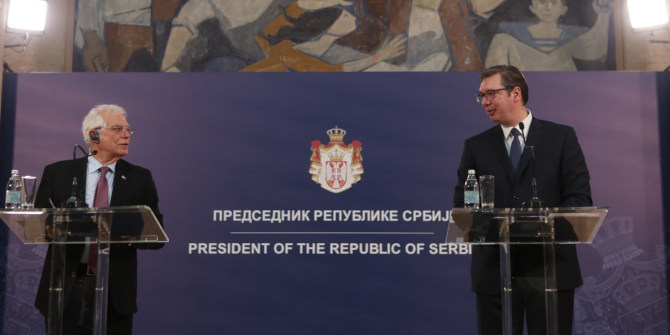Emmanuel Macron is a strong favourite to beat Marine Le Pen in the second round of France’s presidential election on 7 May. But as Susan Milner highlights, having topped the vote in the first round of the election, Macron will now have to deal with a number of new challenges, including greater scrutiny over his policy proposals, and the task of organising his ‘En Marche!’ movement ahead of legislative elections in June.
Phenomenal self-belief, energy and drive propelled Emmanuel Macron to first place in the first round of France’s presidential election, with 24% of the vote. He will most likely, and barring any last-minute major events, become the eighth man to take on the role of President of the French Republic after the second round on 7 May, and by some margin the youngest. Latest opinion polls suggest he could take as much as 62% of the second round vote.
Good fortune has undoubtedly smiled on Mr Macron during his campaign. Voters of mainstream parties had few other options. In a context marked by profound disaffection with the incumbent Socialist administration, the winner of the left primaries Benoît Hamon struggled to have any meaningful presence, whilst the mainstream right candidate, François Fillon, not only virtually disqualified himself with the revelations about allegedly inappropriate payments to his wife and children, but in any case had also failed to make ground beyond his core electorate with a resolutely right-wing programme. As the campaign progressed, Macron became the default candidate for all those worried about the possibility of a victory for Marine Le Pen.
At the same time, he also demonstrated skill and acuity in his own, largely faultless campaign. His pitch based on novelty and lack of party baggage resonated with voters. It remains his main selling point, as he emphasised again in his speech to supporters on Sunday evening: “In the last year, we have changed the face of French politics. […] You did it, you got us here. You are this face of renewal, you are the hope for change, that I hope to bring to victory in two weeks’ time.”
As various commentators have pointed out, Macron’s campaign explicitly echoed the victory of Tony Blair in 1997, and also sought to emulate Barack Obama’s 2008 campaign in its discourse and methods. He has in interviews sought to overcome traditional left-right classifications, arguing that the real battle is now between protectionism and globalisation. His campaign thus seeks to respond to the concerns of the majority of French voters worried about Brexit, the economic nationalism of Donald Trump, and the rise of the far right across Europe.
However, whilst fear of the Front National will most probably carry Macron to the Élysée Palace, he still has some significant problems to face. Commentary in the immediate aftermath of the first round vote has highlighted the persistence of a climate of pessimism in France and the sense of a ‘default’ victory for Macron. Pollsters Ipsos Sopra Seria, who conducted the early exit polling data, noted that Macron voters made a ‘resigned’ rather than enthusiastic choice.
The French electorate showed itself to be profoundly divided on Sunday. The old west-east divide remains salient. Whilst Macron represents the half of France which, broadly speaking, feels confident about globalisation, he faces an opponent who claims to speak on behalf of the other France which feels left behind.
Criticisms of policy weakness which have dogged Macron’s campaign will come to the forefront over the next two weeks and he will need to respond convincingly on policy during the major television debate between the two second-round contenders on 3 May. Voters will want to see how he juggles the desire for radical change with a sense of ‘business as usual’ and stability, for example on French leadership within the European Union, and how exactly the promotion of an open, global country will also provide for those currently worried about their own economic prospects.
Finally, Mr Macron faces the unprecedented challenge of going into a presidential election with no established party apparatus behind him to organise the legislative elections which will follow. He has promised to reveal over the next fortnight the list of parliamentary candidates standing under the ‘En Marche!’ banner, and has previously ruled out including in a future government former ministers as well as local electoral deals with candidates of existing parties. With the Socialist Party in meltdown, his movement may be able to capitalise on support among existing centre-left electorates, but the right may be better able to resist the attraction of a Macron-led centrist majority. So far, very few commentators have been rash enough to make predictions about the likely impact of Macronism on electoral dynamics in the ‘third and fourth’ (parliamentary) rounds to come.
Please read our comments policy before commenting.
Note: This article gives the views of the author, and not the position of EUROPP – European Politics and Policy, nor of the London School of Economics. Featured image: Sebnem Gulfinem (CC BY 2.0)
_________________________________
 Susan Milner – University of Bath
Susan Milner – University of Bath
Susan Milner is Reader in European Politics at the University of Bath.





